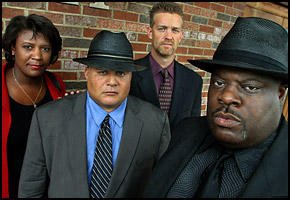 ..is one I just read in a WaPo article by Del Quentin Wilbur that I liked so well I'm regurgitating his byline. His subject is the D.C. natural death squad.
..is one I just read in a WaPo article by Del Quentin Wilbur that I liked so well I'm regurgitating his byline. His subject is the D.C. natural death squad.These are former homicide detectives who investigate what look like natural or self-induced deaths after ruling out criminal cause. It seems they primarily work with people who've died in their homes. Now, I am laden, practically encrusted, with disparate story ideas I'm trying to sculpt into usable plots, but these people are begging to have a book written about them. Look at them, for heaven's sakes! I know they've been posed for this picture, but this is how they dress. Even though I understand they're real people doing a very difficult job, I'm abstractly in love with the concept behind it and how they're different from the detectives we're used to reading about.
What's so compelling about them to a crime-focused fabulist, you ask? Look at them again! And they're stationed in the urban, criminal paradise of Washington D.C. I intend no offense to the residents or law enforcement authorities, but the capitol's long been a fertile producer of crimes both actual and fictional. Here are some of the other factors I found both heroic and provocative:
They deal with the grimmest realities of odor and decomposition and see more bodies, by far, than any other squad. This must exact a physical as well as mental toll. Tied to the numbers involved, they deal with a lot of suicides, and do a ton of family notifications- I would bet this number is also higher than any other squad. This must require reserves of strength and human compassion as well as excellent coping skills to stay sane and grounded.
They're never in a hurry, since the people they serve are already gone and not by foul play. What happens to the pace and procedure if and when they discover, as these former homicide detectives are well qualified to determine, that a crime was involved? The hours are known to be far more reasonable and regular than the homicide detail, and the pace is slower. Plenty of time, I'd think, for a different feeling police drama to unfold.
Cheap cigars, though not necessarily cigar smoking, are an essential tool of the trade. Even the lady detective lights up on site to combat the smells. One detective tucks the snuffed stogie behind his ear as he finishes his tour of the house. I love the images and physicalization tied to this detail.
As often as we see TV detectives developing detailed biographies of murder victims, the natural squad detectives really must wade through the detritus of people's personal lives when they're trying to determine how and when they died. Since they are frequently coming into residences unrestricted by living residents, I'm sure they must search through more homes and possessions than lots of detectives do who would need specific warrants from a judge just to get inside. Simply for notification purposes and to rule out crime, these detectives must get into the cupboards and closets trying to establish identity and often state of mind. Note how one squad member removes the jewelry from a deceased woman and gives it to her family member in order to spare her having to reclaim it from the coroner who might use rougher methods to reclaim the rings. Ranging free in people's unprotected homes requires impeccable honor be a key attribute for squad members. This is a position where someone greedy and unscrupulous could clean a place out or pick up a variety of trinkets before the heirs even knew about the death. This offers an unusual plot device, possibility for discoveries, and promotes a special kind of character underpinning.
This situation is dense with human drama and chances to examine things like family malfeasance or neglect as well as family solidarity. There's isolation, greed, the stress of bearing bad news, battle fatigue, the discoveries of oddities which were private in life. While a death itself may be no crime technically, I can envision lots of other crimes that could be related to or resulting from this kind of death. I shouldn't be happy about that, but from a production standpoint, it is important that an idea has legs.
That's enough, I'm sure, perhaps more than you wanted to know. If you're not a writer, but care at all about the process- and I don't know why you should- I can't speak for anyone else, but this is how my story ideas take root and grow branches. To me, a great premise is one that offers an assumed probability of character development (the options for which are as old as time) and plot complications which are inherently, even uniquely plausible under circumstances that make a story feel fresh and specific.
So there! Thank you, detectives, for sharing your unique careers. And somebody who's a better writer than I had better get on this one, or I'll have to tackle it myself and wreck its great, glowing potential.

1 comment:
You flatter me by implying it would be nuanced, but as I said, there's a lot of potential for crime around these stories, too. What if we discovered the newly deceased by natural causes is implicated by his possesions in some previously unsolved crime? That's only one example, but where people are involved, all convolutions of dirty dealing are imaginable. I think my focus wouldn't be on explicating every grisly, physical truth, but since the nonfiction book Stiff: The Curious Lives of Human Cadavers was a surprise hit, maybe there's a way to work that stuff in, too.
Post a Comment